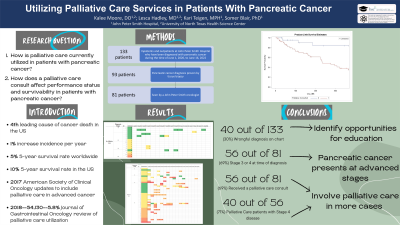Monday Poster Session
Category: Biliary/Pancreas
P1458 - Utilizing Palliative Care Services in Patients With Pancreatic Cancer
Monday, October 23, 2023
10:30 AM - 4:15 PM PT
Location: Exhibit Hall

Has Audio

Kalee Moore, DO
John Peter Smith Hospital
Fort Worth, TX
Presenting Author(s)
Kalee Moore, DO, Lesca Hadley, MD, Somer Blair, PhD, Kari Teigen, MPH
John Peter Smith Hospital, Fort Worth, TX
Introduction: As the incidence of pancreatic cancer is slowly rising, it is now estimated to be the 4th leading cause of cancer related deaths in the United States. The involvement of palliative care in patients with cancer is an official recommendation by the American Society of Clinical Oncology. However, the literature reveals that palliative care remains underutilized in patients with pancreatic cancer.
Methods: Patients with ICD-10 code “C25.X” malignant neoplasm of the pancreas in a 2-year time frame were identified, 133 patients. 40 patients did not have a biopsy-proven pancreatic cancer diagnosis and 12 were not treated for pancreatic cancer by the oncologists. Chart review was performed on the remaining 81 patients: palliative care consult status, date of diagnosis, stage at diagnosis, date of death, Palliative Performance Scale (PPS) scores, and Eastern Cooperative Oncology Group (ECOG) score.
Results: Patients that did not receive palliative care were more likely to have an early stage at time of diagnosis, see Table.
There was a statistically significant difference in the Kaplan-Meier survival curves (p-value: 0.0006), see Figure. Patients who received a palliative care consult were more likely to have deceased by the end of the study period (59% vs. 20%). In addition, many patients had an unknown death status, so their data was censored. None of the patients who did not receive a palliative care consult moved to hospice care, compared to 25% of the patients who did see palliative care. After 365 days from date of diagnosis, the status of all patients was: 23 patients (28%) alive, 32 patients (40%) died, 9 patients (11%) transferred to hospice care, 10 patients (12%) moved, and 7 patients (8.6%) were lost to follow-up.
Discussion: In conclusion, this study revealed areas of improvement in the care of patients with pancreatic cancer. Careful input of diagnoses needs to be considered when entering information in the record. Baseline ECOG scores were found to be higher in the patients being referred to palliative care versus those who were not referred. This could imply the referral is being made later in the disease course or when the patient is experiencing more debilitating symptoms. The current ASCO guideline recommends a palliative care consult for patients with advanced cancer regardless of performance score. This study adds to the literature in support that palliative care services are being underutilized in the management of pancreatic cancer patients.

Disclosures:
Kalee Moore, DO, Lesca Hadley, MD, Somer Blair, PhD, Kari Teigen, MPH. P1458 - Utilizing Palliative Care Services in Patients With Pancreatic Cancer, ACG 2023 Annual Scientific Meeting Abstracts. Vancouver, BC, Canada: American College of Gastroenterology.
John Peter Smith Hospital, Fort Worth, TX
Introduction: As the incidence of pancreatic cancer is slowly rising, it is now estimated to be the 4th leading cause of cancer related deaths in the United States. The involvement of palliative care in patients with cancer is an official recommendation by the American Society of Clinical Oncology. However, the literature reveals that palliative care remains underutilized in patients with pancreatic cancer.
Methods: Patients with ICD-10 code “C25.X” malignant neoplasm of the pancreas in a 2-year time frame were identified, 133 patients. 40 patients did not have a biopsy-proven pancreatic cancer diagnosis and 12 were not treated for pancreatic cancer by the oncologists. Chart review was performed on the remaining 81 patients: palliative care consult status, date of diagnosis, stage at diagnosis, date of death, Palliative Performance Scale (PPS) scores, and Eastern Cooperative Oncology Group (ECOG) score.
Results: Patients that did not receive palliative care were more likely to have an early stage at time of diagnosis, see Table.
There was a statistically significant difference in the Kaplan-Meier survival curves (p-value: 0.0006), see Figure. Patients who received a palliative care consult were more likely to have deceased by the end of the study period (59% vs. 20%). In addition, many patients had an unknown death status, so their data was censored. None of the patients who did not receive a palliative care consult moved to hospice care, compared to 25% of the patients who did see palliative care. After 365 days from date of diagnosis, the status of all patients was: 23 patients (28%) alive, 32 patients (40%) died, 9 patients (11%) transferred to hospice care, 10 patients (12%) moved, and 7 patients (8.6%) were lost to follow-up.
Discussion: In conclusion, this study revealed areas of improvement in the care of patients with pancreatic cancer. Careful input of diagnoses needs to be considered when entering information in the record. Baseline ECOG scores were found to be higher in the patients being referred to palliative care versus those who were not referred. This could imply the referral is being made later in the disease course or when the patient is experiencing more debilitating symptoms. The current ASCO guideline recommends a palliative care consult for patients with advanced cancer regardless of performance score. This study adds to the literature in support that palliative care services are being underutilized in the management of pancreatic cancer patients.

Figure: Product-Limit Survival Estimates
Disclosures:
Kalee Moore indicated no relevant financial relationships.
Lesca Hadley indicated no relevant financial relationships.
Somer Blair indicated no relevant financial relationships.
Kari Teigen indicated no relevant financial relationships.
Kalee Moore, DO, Lesca Hadley, MD, Somer Blair, PhD, Kari Teigen, MPH. P1458 - Utilizing Palliative Care Services in Patients With Pancreatic Cancer, ACG 2023 Annual Scientific Meeting Abstracts. Vancouver, BC, Canada: American College of Gastroenterology.
